Hardwood Flooring
It all starts with the wood. While each tree is different, there are similarities within each specific type of tree. Bellevue Floor Service will help you choose the wood that best suits your needs, explaining to you how each one looks, feels, wears, and costs.
Floor Rating System
Hardness
This relates to the density of the wood. The higher the number, the firmer the surface of the lumber used for your floor.
Stability
Wood contracts and expands with the level of moisture in the air. Some types of wood more than others. Those rated “above average” will contract and expand the least.
Radiant Applications
This applies only to use on radiant heat systems. Wood with a high radiant factor will be most appropriate for use on these systems.
Exotic Hardwood
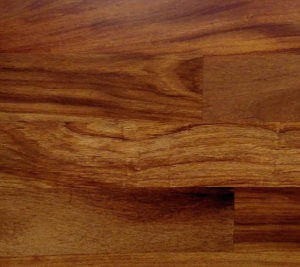
PERUVIAN OLIVEWOOD
Peruvian Olivewood is a hard and very stable wood with a singular look. This handsome wood has a fine texture with a broad grain structure. Its colors range from light golden brown to dark chocolate brown with accents of burgundy and frequent irregular dark streaks. The color tones will darken a few degrees over 3-6 months. Different looks can be achieved depending on the type of finish used.
Hardness: 2360 lbs./sq. in.
Stability: Above Average
Radiant Applications: Yes
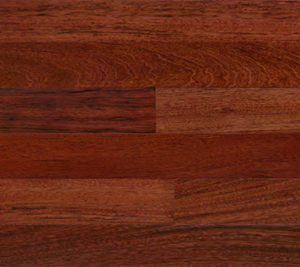
JATOBA – also called Brazilian Cherry
Jatoba is the most common exotic wood and one of the most popular. It is very hard, fairly-stable, and it holds up to traffic extremely well. Jatoba has a deep, lovely color range. Initially it is initially salmon red to burnt orange brown with black grain character; becoming russet to reddish cherry brown over time—it takes up to a full 12 months for Jatoba to reach its mature color.
Hardness: 2760 lbs./sq. in.
Stability: Average
Radiant Applications: No
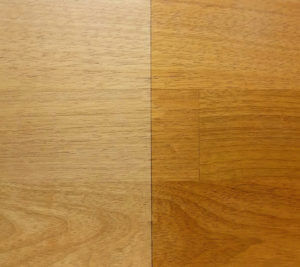
PALOMINO
is a wonderfully versatile exotic hardwood. From its beautifully golden appearance that makes you think of a Rosewood, to a light natural blonde that makes the grain stand at attention to be admired. This flooring is: stable, hard, and non-photosensitive. It takes stain phenomenally well; colors go on smooth and rich. This hardwood gives you unlimited options.
Hardness: 1800 lbs./sq. in.
Stability: Above Average
Radiant Applications: Yes
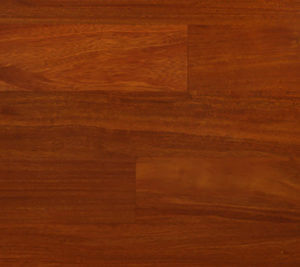
SANTOS MAHOGANY
is an excellent value, considering how attractive and how hard it is. Regular Mahogany is too soft for most flooring applications. Santos Mahogany, on the other hand, offers the rich look and tight grain of mahogany, but it is much more dense and stable. Color ranges from orange brown to dark reddish brown with pinkish tones. The grain structure is fairly consistent throughout. Santos Mahogany is NOT photo-sensitive, and will not darken as most woods do.
Hardness: 2200 lbs./sq. in.
Stability: Above Average
Radiant Applications: Yes
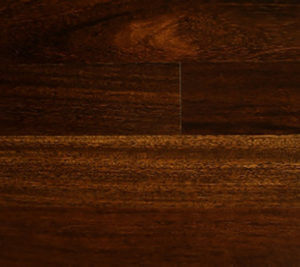
CHONTAQUIRO – also called Peruvian Walnut
is a beautifully unique wood that is not easily found in the United States. Chontaquiro is very durable and quite stable. It also has a consistent color with a strong grain texture. Chontaquiro has minimal color change over time, similar to Peruvian Olivewood.
Hardness: 2880 lbs./sq. in.
Stability: Above Average
Radiant Applications: Yes
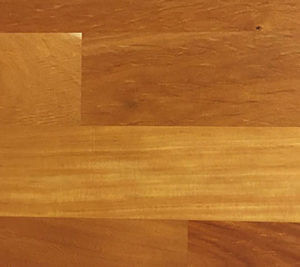
GARAPA – also called Brazilian Oak
is a hard and stable flooring. Garapa is photo-sensitive; initially very light golden yellow in color with subtle grain structure. After 3-6 months, Garapa will darken into warm golds that weave across your floor with rich caramel tones laced throughout.
Hardness: 2300 lbs./sq. in.
Stability: Above Average
Radiant Applications: Yes
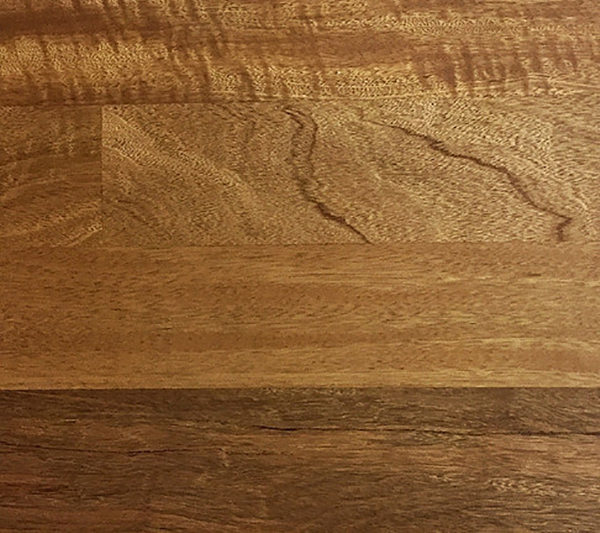
YACUSHAPANA
Clear Grade is exotic, yet simple in appearance with a very consistent coloring and grain structure. The blonde-gold coloring with it’s almost white gold iridescence ribbons will give your floor an internal glow that is irreplaceable.
Natural Grade is wild and untamed. Like a cousin to Tiger Wood in appearance, without the Photo-sensitivity or instability in wider widths. Yacushapana takes stains very well, so the sky is the limit!
Hardness: 2200 lbs./sq. in.
Stability: Above Average
Radiant Applications: Yes
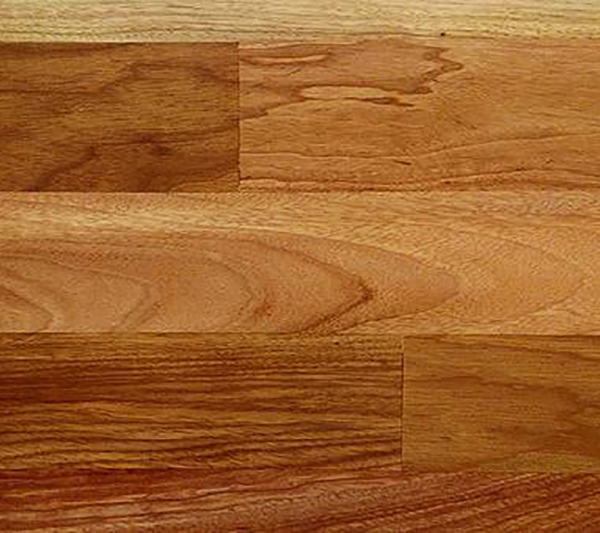
SOUTH AMERICAN PEAR WOOD
is one of the most popular and stable exotics offered. The color ranges from light blonde gold to a warm mid-tone gold with dusty rose tones. These colors develop over time, initially the wood is light and golden in color. South American Pear wood has unique grain characteristics, with some boards being sedate and other having a beautiful marbling.
Hardness: 2000 lbs./sq. in.
Stability: Average
Radiant Applications: No
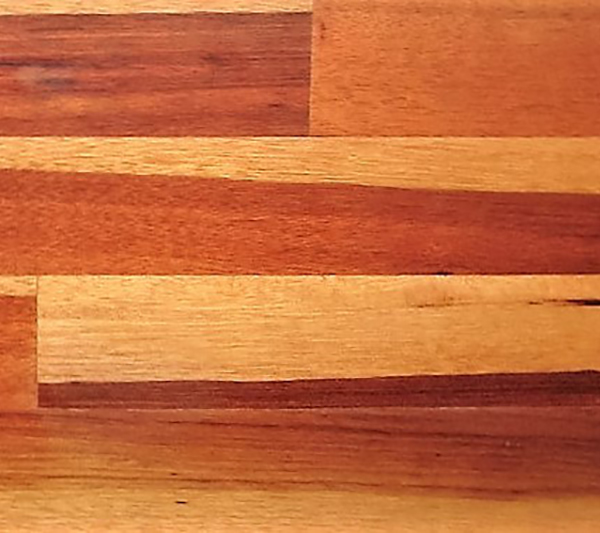
SAMBAWOOD
is a stable and lively hardwood, hence the name. It has an interesting mixture of medium and dark brown tones that are laced with accenting colors of blonde tones and burgundy. It is currently only available in Character grade*. It takes well to stains and finishes.
*Character grade allows for minor defects such as tiny knots, sapwood, etc.
Hardness: 1300 lbs./sq. in.
Stability: Average
Radiant Applications: No
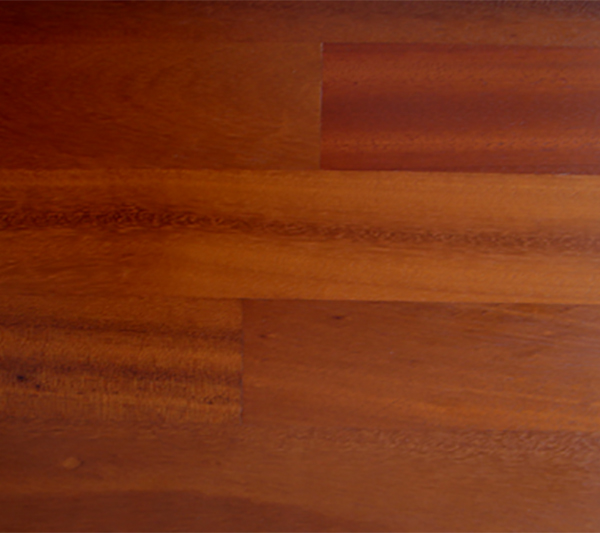
TATAJUBA
is initially yellow in color, changing to light/medium brown after 3 – 8 months, depending on daylight conditions. It has a very antiquarian character and uniform appearance. It’s hard and very stable, with the exception of radiant heat installation.
Hardness: 1760 lbs./sq. in.
Stability: Above Average
Radiant Applications: Yes
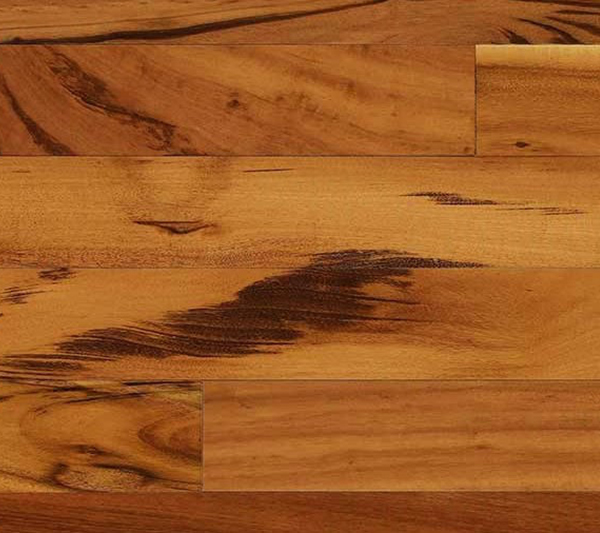
TIGER WOOD – also called Goncalo Alves or Muiracatiara
is a truly exotic wood. It has long been prized for both its beauty and uniqueness. Its color ranges from orange/reddish brown to a deep red brown. But Tiger Wood’s most striking feature is its series of bold and irregular brown or black markings that look like stripes. The wood is very strong and very durable, with a natural luster and fine grain that can be straight or wavy. Tiger Wood is a highly photo-sensitive; initially light orange and blonde, it’s mature color will develop within 3-6 months.
Hardness: 2160 lbs./sq. in.
Stability: Average
Radiant Applications: No
Domestic Hardwood
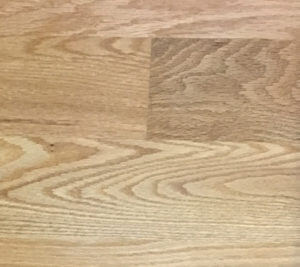
RED OAK
is a very popular, easily available hardwood. It offers a smooth, even grain with a slightly reddish tone.
Hardness: 1290 lbs./sq. in.
Stability: Average
Radiant Applications: Yes, with quarter-sawn and rift-sawn lumber only
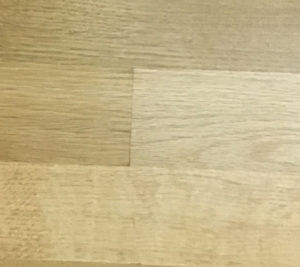
WHITE OAK
is much like the Red Oak, with smooth and even wood grain. Creates a floor that has even tones. The natural white color of the wood allows for consistent and accurate stain reproduction.
Hardness: 1360 lbs./sq. in.
Stability: Average
Radiant Applications: Yes, with quarter-sawn and rift-sawn lumber only
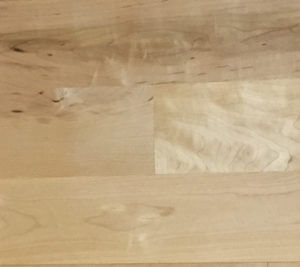
MAPLE
is a very pale, creamy white color with slight shade differences from board to board. Depending on the grade chosen, Maple flooring can contain minimal to a lot of brownish/black mineral streaks, Clear grade maple has the least of this streaking. Maple graining is very light and fine and many times barely discernible. Grain will range from uniformly straight lines to curly patterns.
Hardness: 1450 lbs./sq. in.
Stability: Average
Radiant Applications: No
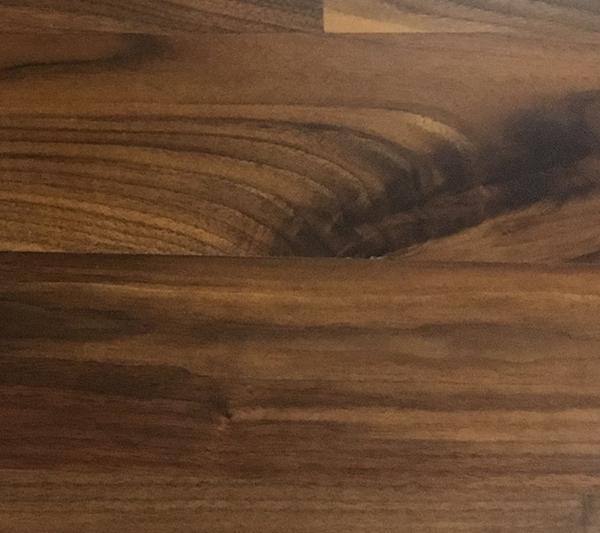
WALNUT
usually has fine, straight graining and coloring is a rich, almost chocolate brown. Homeowners like the natural color of Walnut flooring and the warmth it automatically adds to a room. There is some color variation from board to board, as the sapwood can range from light tan to medium brown Walnut hardwood flooring can be a character grade showing knots and other grain variations.
Hardness: 1010 lbs./sq. in.
Stability: Average
Radiant Applications: No
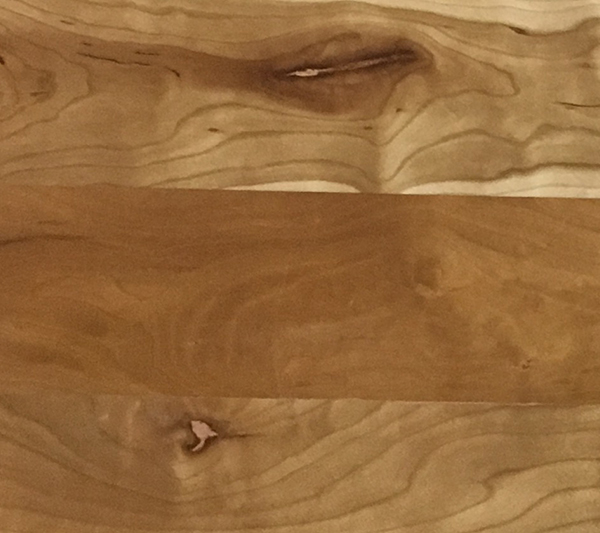
AMERICAN CHERRY
has such wonderful, graceful graining and color. This wood species has a very distinctive charm and is popular because of its natural color variation from board to board and its warm natural color. Because of the unique graining and coloring of American Cherry flooring, many homeowners like to use it in wider planks.
Hardness: 950 lbs./sq. in.
Stability: Average
Radiant Applications: No
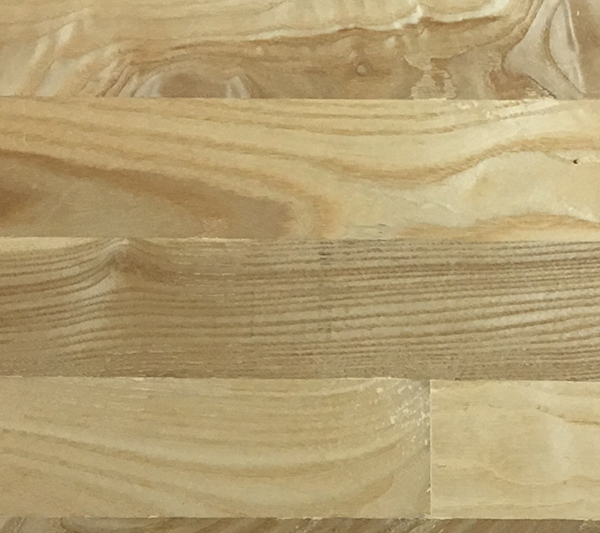
ASH
is known for color variation from pale white to light/medium brown. Graining is bold and can appear straight, curly or wavy. Ash flooring is very similar to White Oak, but adds a bit more excitement to a room with its more unique graining.
Hardness: 1320 lbs./sq. in.
Stability: Below Average
Radiant Applications: No
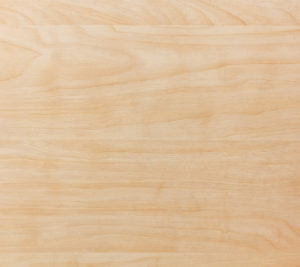
BEECH
heartwood is a warm brown color with red undertones, while the sapwood is mostly pale tans.
Hardness: 1300 lbs./sq. in.
Stability: Below Average
Radiant Applications: No
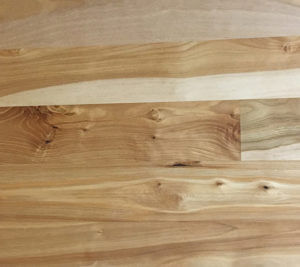
RED/YELLOW BIRCH
have slight color variation from board to board. Graining of Birch is generally fine with uniform curls and some boards may appear to be almost clear with little to no graining at all.
Hardness: 1260 lbs./sq. in.
Stability: Average
Radiant Applications: No
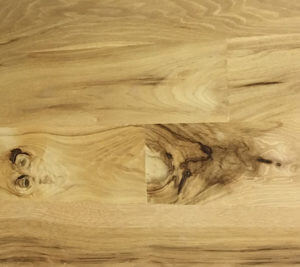
HICKORY
is one of the hardest domestic wood species and is highly popular because of its natural color variation and unusual graining. Coloring for Hickory Hardwood flooring can range from creamy whites to medium browns (with even darker browns in some rustic grades).
Hardness: 1820 lbs./sq. in.
Stability: Above Average
Radiant Applications: Yes
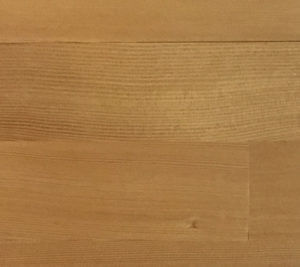
DOUGLAS FIR
has a light, rosy color that’s unique from the more yellowish oak species or dark walnuts. It is a relatively soft wood, ideal for applications requiring distressing.
Hardness: 660 lbs./sq. in.
Stability: Below Average
Radiant Applications: No
Flooring Cut Options
How the board is cut from the log will create different patterns in the grain. Once you have selected a specific type of wood for you floor, Bellevue Floor Service will show you the cuts that are available.
